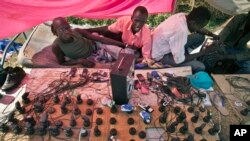South Sudanese technology firms have launched the country's first mobile money transfer platform, M-Gurush. It allows customers to pay for goods and services across South Sudan, similar to platforms in Kenya and other African countries. While a 2018 peace deal allowed for the service to be rolled out across the country, there are still infrastructure challenges.
South Sudan celebrated a rare advance in technology this month as it launched a nationwide system for mobile money transfers.
The new service called M-Gurush — M for mobile and Gurush for money in Arabic — removes the need for a bank account, which most South Sudanese lack.
High hopes for new system
Lado Kenyi, director general of the National Communication Authority, has high hopes for the new system.
"The real success of mobile money is in targeting the people of low income and our rural population,” Kenyi said. “Those are the people we want to reach and include them into the financial system."
South Sudan's Minister of Information Michael Makuei demonstrated the ease of use by purchasing a cow with his mobile phone.
He said it will take time for rural South Sudanese to trust cashless payments.
"You have a very big task to do,” Makuei said. “You need to sensitize the people of South Sudan. Including me. You need to sensitize the people of South Sudan on this M-Gurush because it is not enough."
Ravaged by years of war and conflict, South Sudan is racked by poverty and has one of Africa's lowest rates of mobile phone penetration — just 21 percent.
Joshua Makuru is an telecommunications specialist in Juba.
"One of the biggest challenges is network coverage, because as we all know after the war, telecom infrastructure was destroyed, especially most of the telecom infrastructure in the villages,” Makuru said.
New jobs expected
However, Wilson Ladu, who works for one of the South Sudanese companies behind M-Gurush, ZAIN Telecommunications, is confident that mobile money marks the beginning of a new era.
"We know the fiber optics is around the corner, it's just almost to this town, to Juba, where this town, this country will be connected by fiber,” Ladu said.
Mobile money is expected to speed up trade and add thousands of new jobs to South Sudan's struggling economy.
It also puts South Sudan in the ranks of other East African nations using mobile money, such as Kenya, Rwanda, Tanzania, and Uganda.




